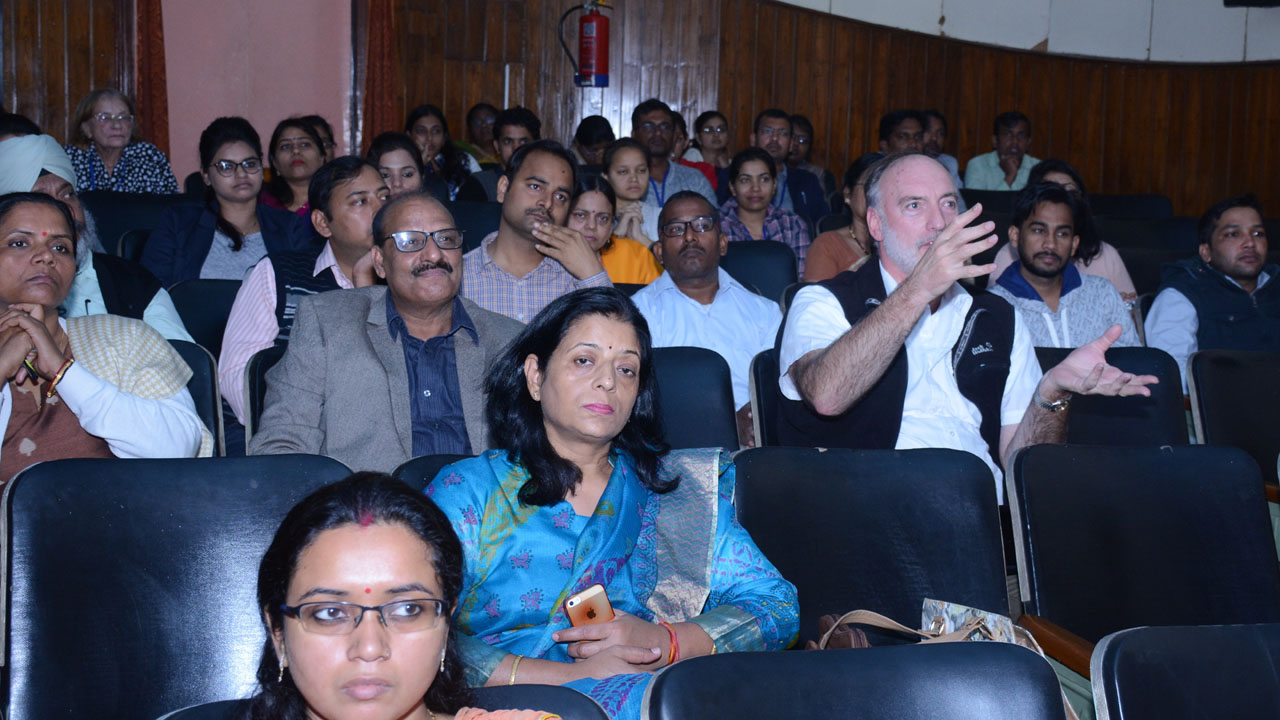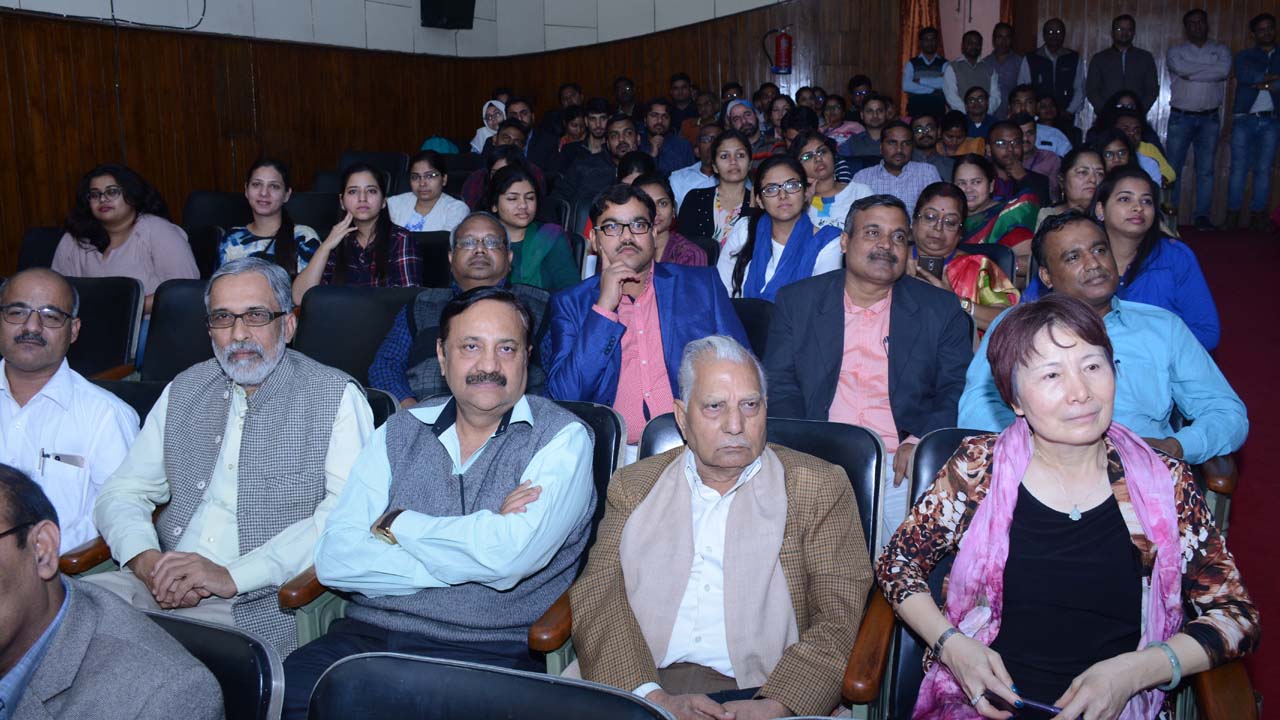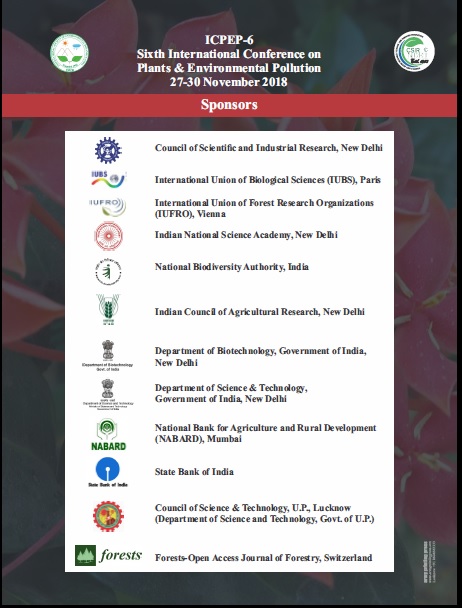Sixth International Conference on Plant and Environment
(ICPEP-6)
(27-30 November, 2018)
Nature has provided the basic ingredients for living in abundance and whatever is used up during normal course of living is recaptured through natural cycle. Any effort to disturb this process leads to environmental pollution. Human beings are exposed to pollutants in many ways through the air they breathe, the water they drink, the food they eat and the cosmetics, drugs and other products they use. Pollution prevention is a major global concern because of the harmful effects of pollution on a person’s health and on the environment.
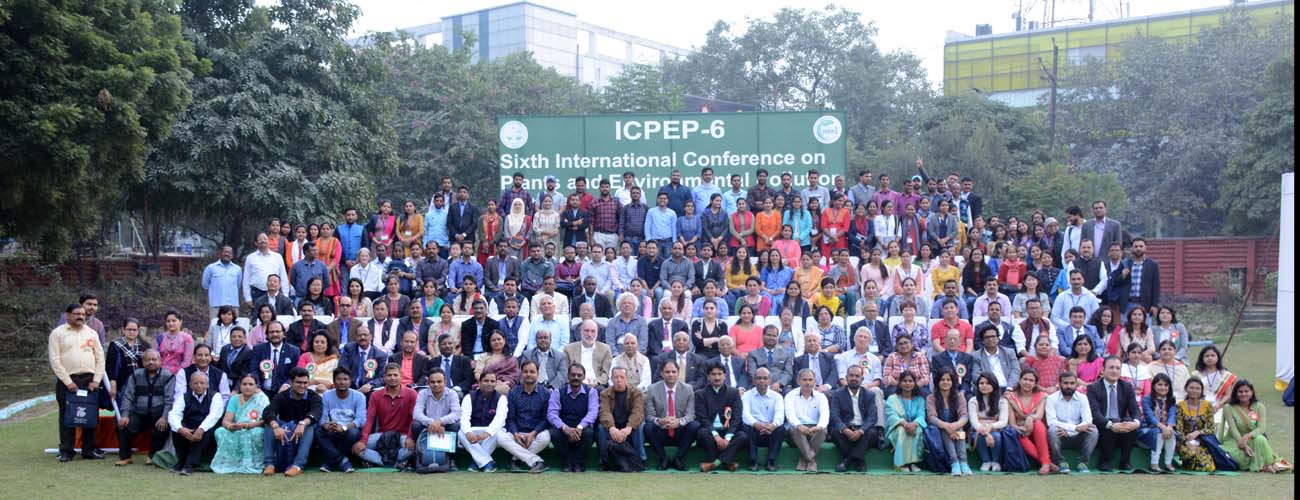
The trans boundary nature of environmental pollution makes even more difficult to manage. Climate change is the biggest threat faced by the planet today. When it comes to the hazards of environmental pollution, there is only a very thin dividing line between developed and developing countries now. One pollutes and the other suffers from its consequences equally, if not more. The Sixth International Conference on Plants and Environmental Pollution (ICPEP-6) was organized during November 27-30, 2018 with the aim to bring together leading academicians, scientists, researchers and research scholars to exchange and share their experiences and research results on all aspects of Environmental Pollution and Plants. It also provided an excellent interdisciplinary platform for researchers, practitioners and educators to present and discuss the most recent innovations, trends and concerns as well as practical challenges encountered and solutions adopted in the fields of Environmental Pollution and Plants.
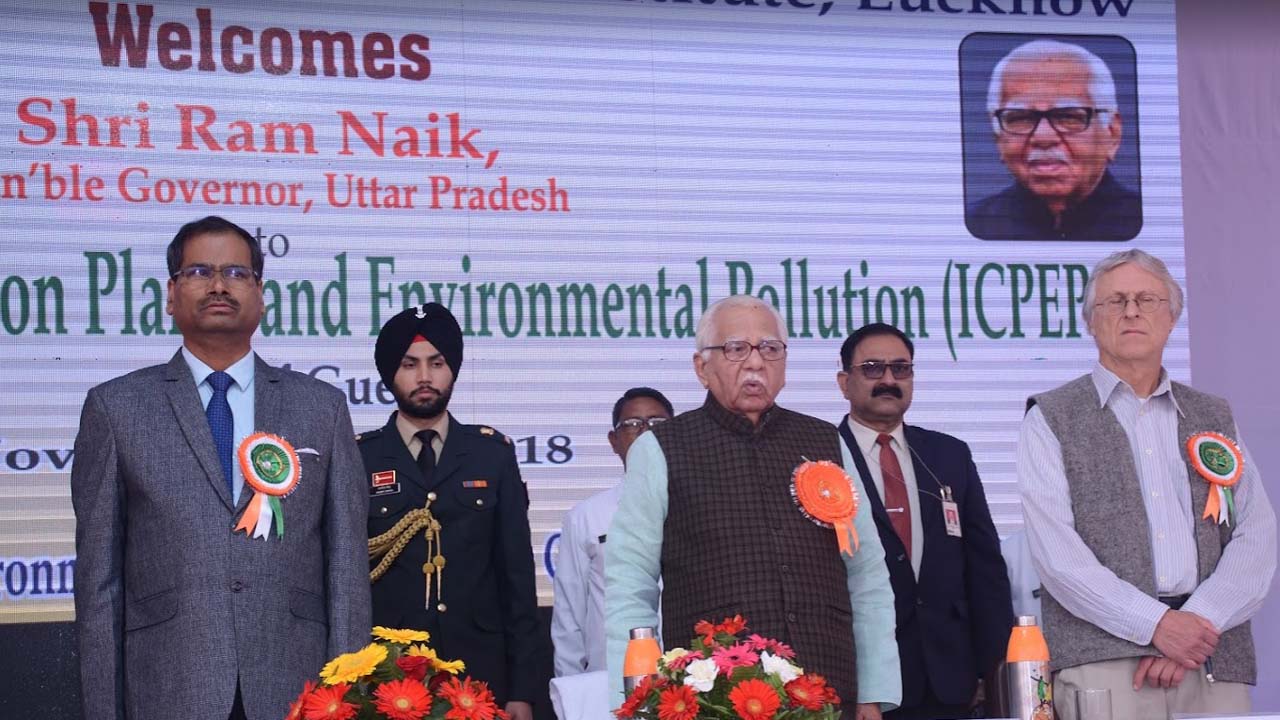
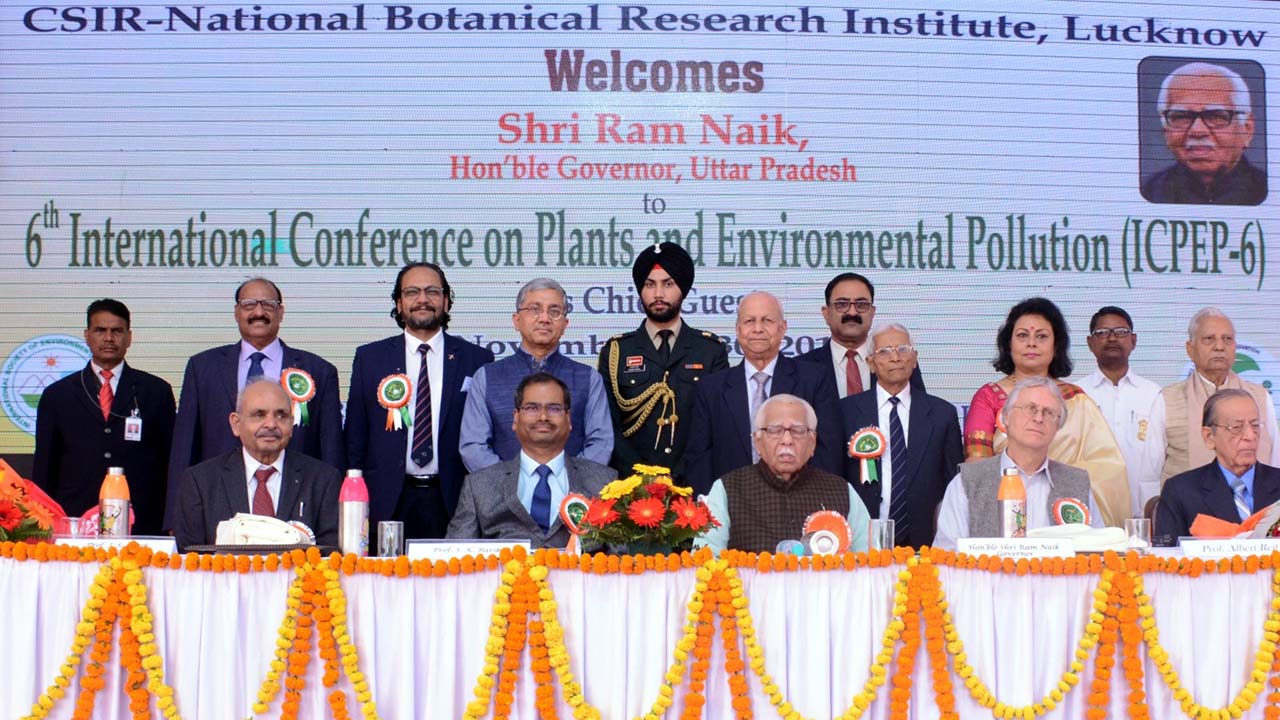
Prestigious international and national scientific organizations such as International Union of Biological Sciences (IUBS), Paris, France; International Union of Forest Research Organizations (IUFRO), Vienna, Austria; Council of Scientific and Industrial Research (CSIR); Indian National Science Academy, Department of Science & Technology (DST); Department of Biotechnology (DBT); Indian Council of Agricultural Research (ICAR); National Biodiversity Authority (NBA); State Bank of India (SBI) and National Bank Agriculture and Rural Development (NABARD) sponsored the ICPEP-6.
The conference was jointly organized by International Society of Environmental Botanists (ISEB) and CSIR-National Botanical Research Institute at CSIR-NBRI, Lucknow, India.
The Conference was formally inaugurated by Shri Ram Naik, Hon’ble Governor, Uttar Pradesh. Prof. J.S. Singh, INSA honorary and renowned scientist and Prof. Albert Reif, Institute of Forest Sciences, Faculty of Environment and Natural Resources, Albert-Ludwigs University, Freiburg, Germany, graced the occasion as Guests of Honour. In the inaugural session at CSIR-NBRI, Lucknow, Hon’ble Governor welcomed all the delegates and the distinguished scientists from all over the world to Lucknow. He hoped that this gathering would provide an opportunity to discuss and draft the solution for consistently increasing problems due to climate change and environmental pollution, affecting millions of people around the globe. Hon’ble Governor mentioned that the pollution not only affect plants but also indirectly affect the insects and other animals dependent on that plant, hence research is needed to find out the impact of pollution on plants and animal products used by human beings in daily life. He also emphasized the need to find out new energy resources in order to meet out the energy demand in future in context to ever increasing human population and consistently changing environmental conditions. He wished a great and comfortable stay to all the delegates and also to enjoy the history, culture and delicious dishes of Lucknow. He suggested that everyone should plant at least one tree in honour of his or her life partner. Earlier, Prof. S.K. Barik, Director, CSIR-NBRI, Lucknow welcomed all the guests and dignitaries and apprised about the history and achievements of the CSIR-National Botanical Research Institute in general and the area of Ecology and Environmental Science in particular. Prof. Albert Reif, in his address discussed the impacts of forest conservation with examples of oak trees.
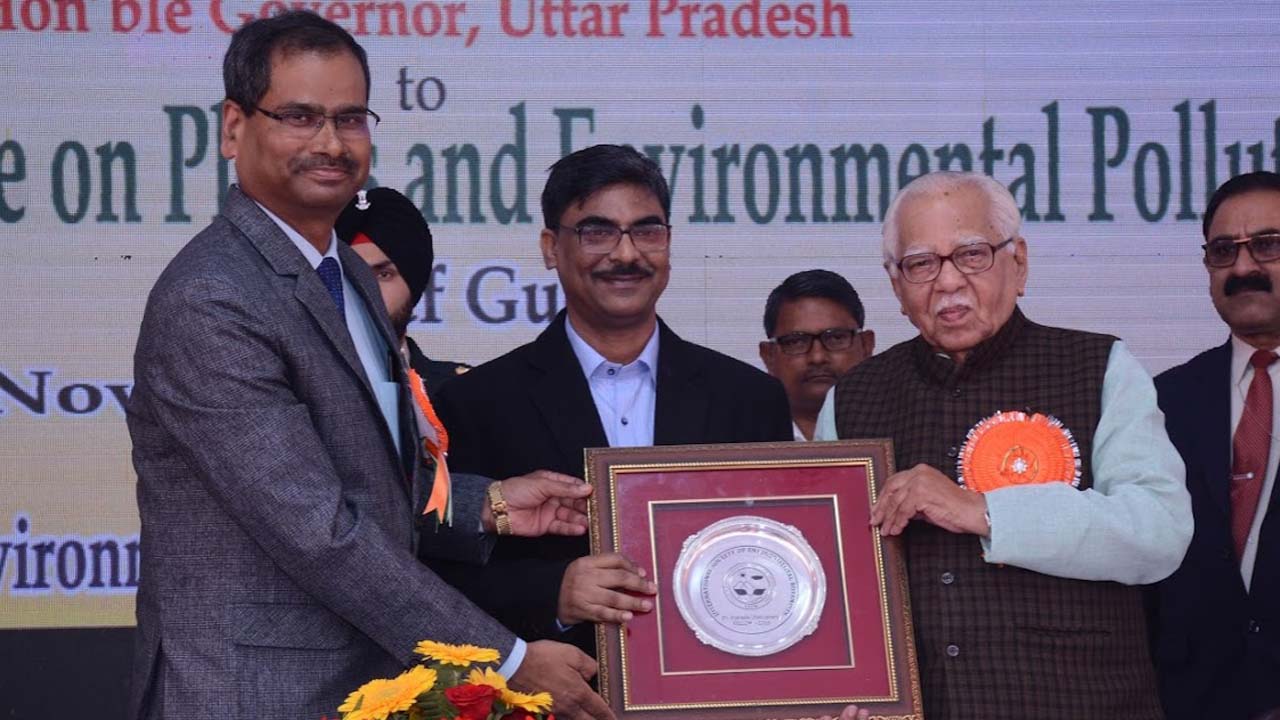
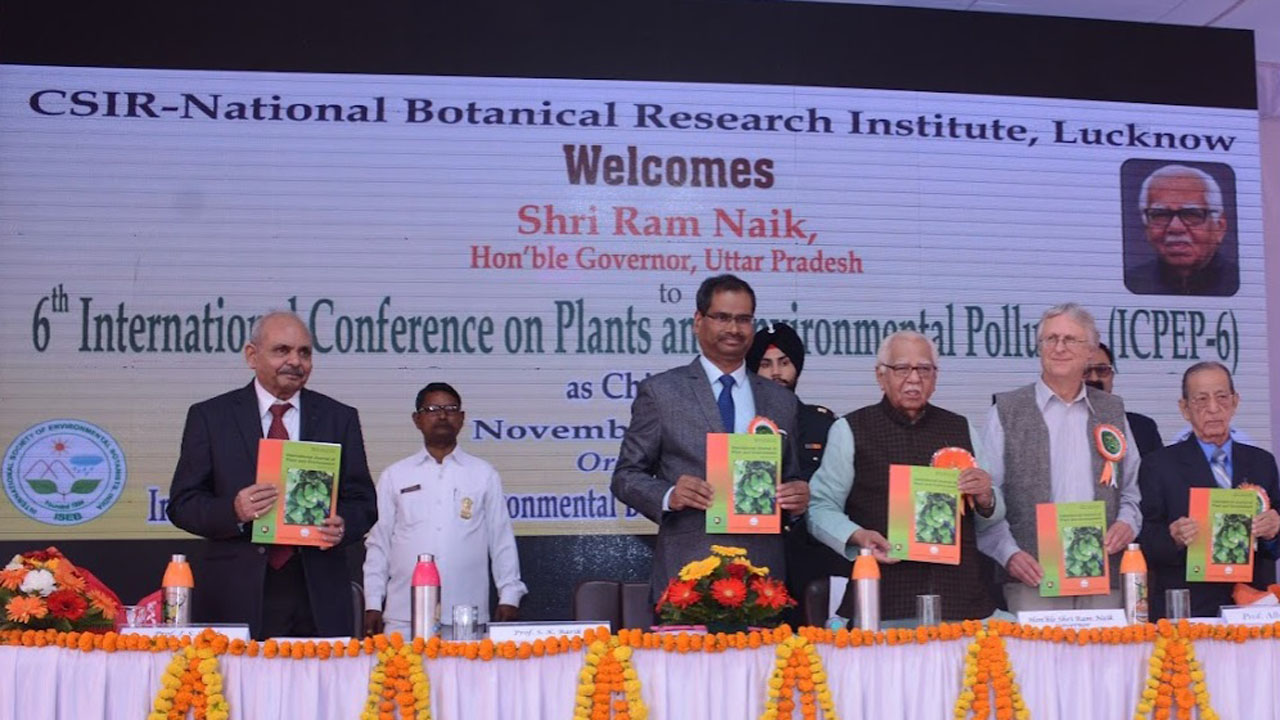
On this occasion, Hon’ble Shri Ram Naik, honoured nine scientists and researchers with Fellowship of the International Society of Environmental Botanists (FISEB). The dignitaries also released the Abstract Book of the Conference (ICPEP-6), ISEB Newsletter and a Research Journal, International Journal of Plant and Environment.
INSA Honorary Scientist, Prof J.S. Singh delivered a lecture on current environmental crisis and discussed the impact of climate change and environmental pollution due to human activities. He informed about the crucial fact that how we are losing about 1800 populations of different species at an hourly rate. At this rate, about 25% species of different organisms will be on the verge of extinction by the year 2030. Not only this, global warming will increase the temperature by 5 degree, affecting the shore lines and will increase the sea level by 88 cm as estimated by 2100, ultimately resulting in the submergence of many low lying coastal areas.
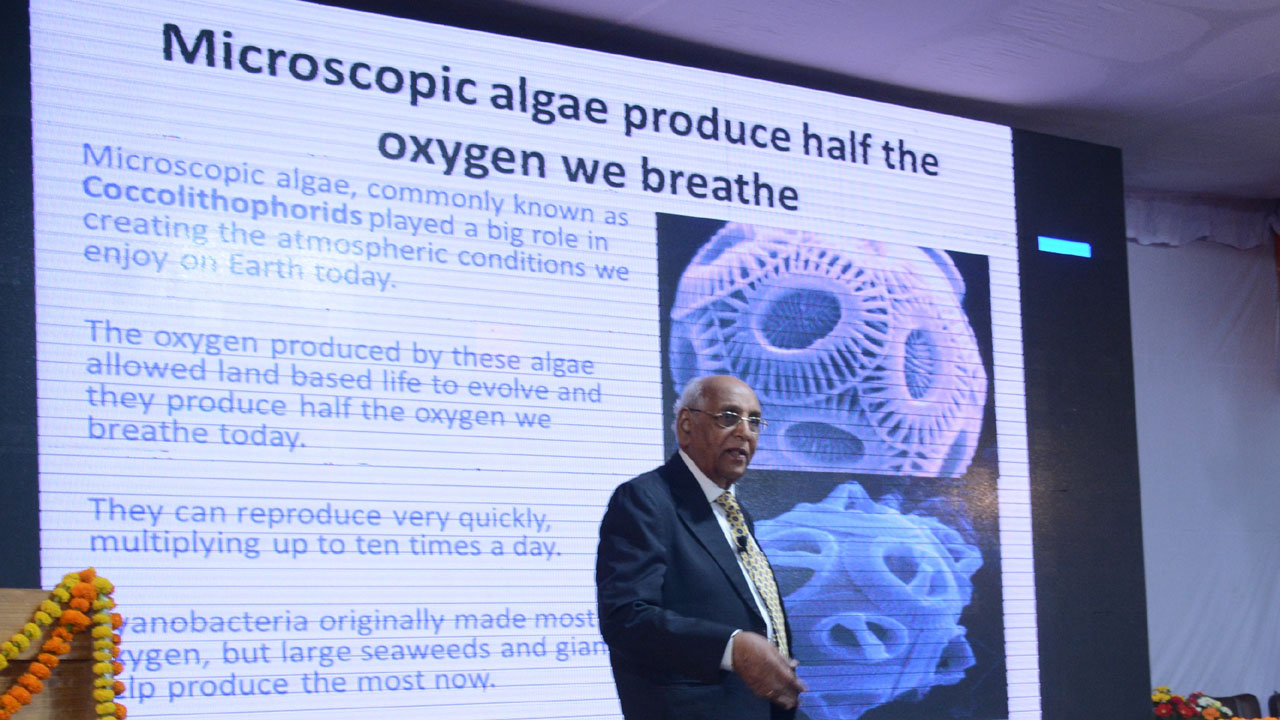
During Conference, around 400 delegates from 20 countries participated. Distinguished scientists from India and abroad delivered key note addresses and special lectures. Total 413 abstracts were received and were categorised into 8 scientific sessions, which included 174 oral and 239 posters presentations. As the number of speakers was large, lectures were conducted in three concurrent sessions in three halls. The conference provided a vibrant interactive forum for serious discussions on the pressing problems of pollution and the role of plants in its amelioration.
Deliberations in scientific sessions focused on: Climate change: adaptation, mitigation, carbon sequestration and food security; Biodiversity, prospection and conservation; Environmental biotechnology and microbiology; Environmental impact assessment; Sub-tropical and tropical oaks under global change; Bio monitoring and bio-remediation; Plant responses to environmental pollution; and Contemporary issues in environment and plant.
A special talk by Prof. C.K. Varshney, Professor Emeritus and former Dean, School of Environmental Sciences, Jawaharlal Nehru University and Visiting Professor, Asian Institute of Technology, Bangkok, was delivered on “Biodiversity: A vital resource for civilization, economic development and well being”, highlighting the serious threats to biodiversity which may amplify climate warming, leading to unforeseen and potentially irreversible shifts in the earth system. One special session devoted to Prof. H.S. Srivastava Foundation for Science and Society (PHSSFSS) was also organized and Prof. Albert Reif from University of Freiburg, Germany delivered the Prof. H.S. Srivastava Memorial Lecture. He was felicitated with the PHSSFSS Medal for his contribution in the area of forest ecosystem management.
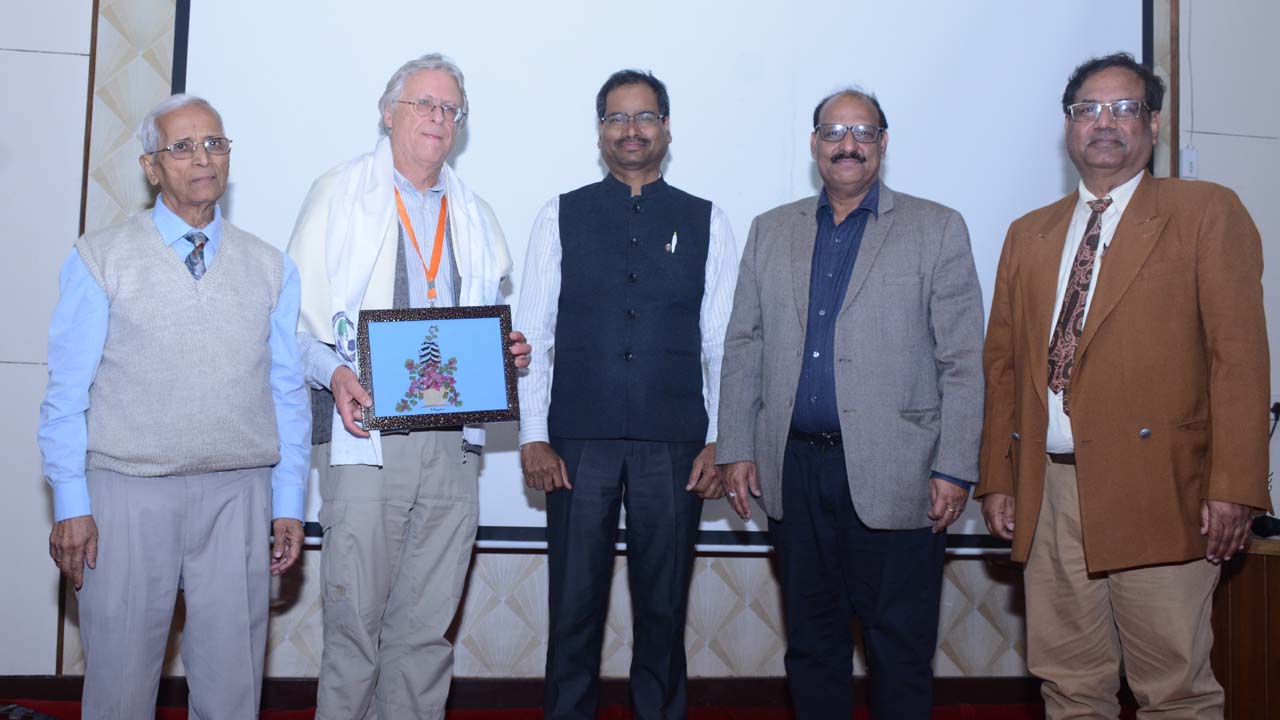
The key note lectures were given by leading researchers in relevant fields. In climate change session, Prof. Erwin Grill, Chair of Botany, Technical University of Munich, Germany, delivered key note lecture on “Challenges and chances to get more crop per drop by using abscisic acid receptors”. He addressed the mechanisms involved in the homeostasis of plant’s water status through control of transpiration by the phytohormone abscisic acid. In the biodiversity session, Prof. P. Pushpangadan, DG of Amity Institute for Herbal and Biotech Products Development, Thiruvananthapuram and Senior Vice President of the Ritnand Baldev Education Foundation, New Delhi, India emphasized the importance of genetic diversity which would enable the breeders to tailor crops to meet the increased productivity, adapt changing climatic conditions and disease resistance. In another key note presentation in session Environmental Biotechnology, Dr. Alok K. Sinha, Scientist, National Institute of Plant Genome Research, New Delhi, India talked about regulation of submergence tolerance in rice by a mitogen activated protein kinase. He discussed the role of protein kinase, MAP/MAPK cascade in seedling development in Arabidopsis and submergence tolerance in rice. His group has performed various physiological, biochemical, molecular and genetics related experiments to highlight pleiotropic roles of MAP kinase cascade in plants.
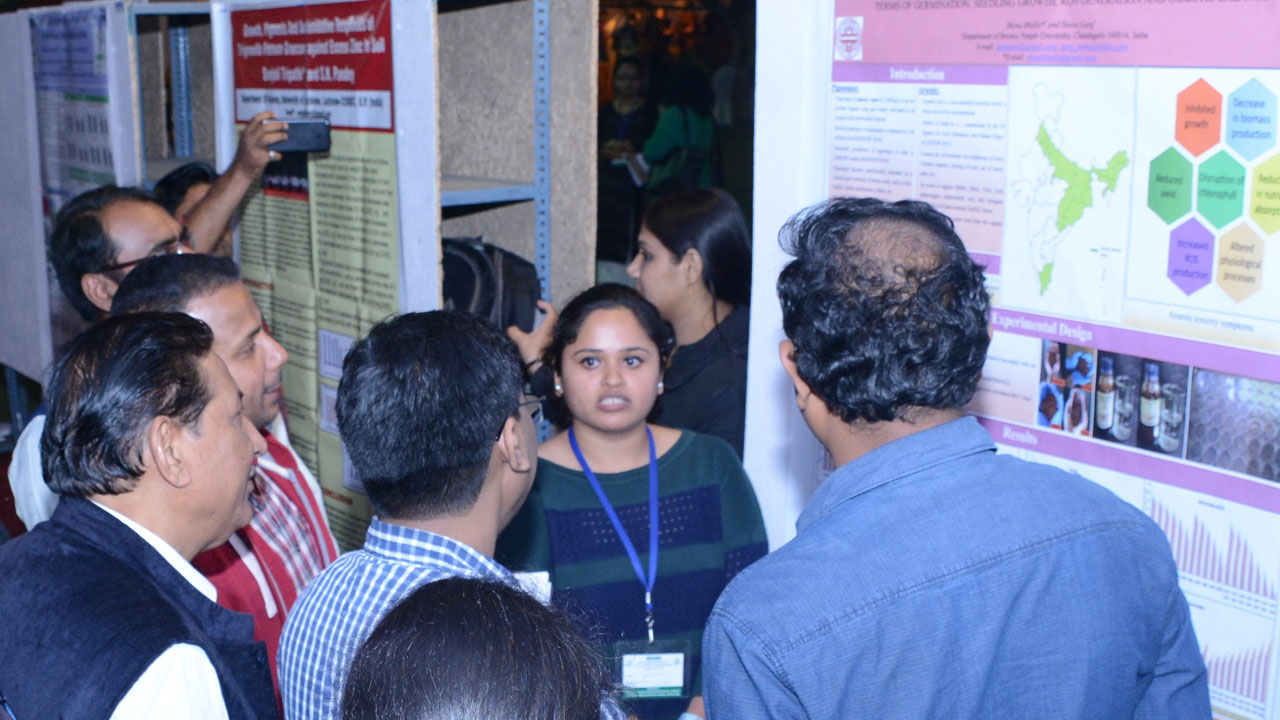
In session on Environmental monitoring and Bioremediation, Prof. Lena Q. Ma, University of Florida, USA through her key note address highlighted the molecular mechanisms behind the efficient arsenic uptake and detoxification by Pteris vittata and optimizing its arsenic hyperaccumulation capacity for phytoremediation application in contaminated soils. In the same session, Prof. Om P. Dhankher, University of Massachusetts, USA emphasized on the glutathione homeostasis which plays important role in maintaining cellular redox for protection of plants under abiotic stresses and holds great potential for developing climate resilient crops, as well as developing plants for phytoremediation of toxic metals and metalloids. In the session on Contemporary Issues in Environment and Plant Mr. Mahendra Modi, DGP, UP, India delivered a key note lecture on the innovative methods for rain water harvesting through his water conservation models for buildings in Indian cities.
Following the keynote lecture on the role of abscissic acid receptors in harvested more crop per drop, other lectures in ‘Climate Change’ dealt with the various adaptation and mitigation strategies, carbon sequestration monitoring in different areas of the world and food security in the changing climatic condition, emphasizing on the increasing stress on agricultural systems due to the climatic changes, leading to decrease in yield at the time when demand for food is growing dramatically.
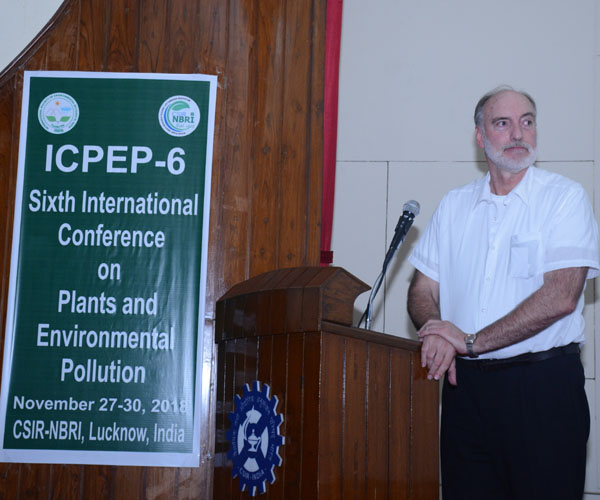
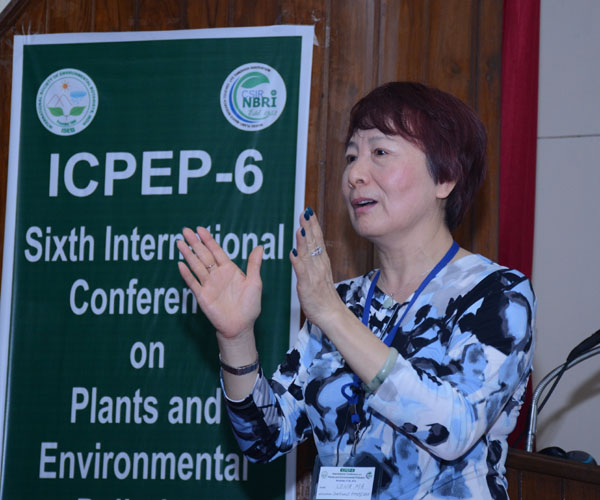
Following a special lecture focusing on biodiversity as a sustainable resource for economic development for population and civilization, other lectures in the session of ‘Biodiversity Prospection and Conservation’ focused on the impact of changing climate and weather condition on local as well as global food, fiber and forest production and ecosystem goods and services. Exploration was to identify genotypes through environmental interactions, to understand the variability and to assist the breeders select the best lines of plants suited in a changing climate.
The session on ‘Environmental Biotechnology and Microbiology’ emphasized on the genomic basis of the responses and adaptation of plants to climate change, abiotic stress tolerance and environmental pollution in order to use genetically improved plants for sustainable management of the environment stresses. The session also dealt with assessing the role of microbes in reducing environmental stress induced in crops.
The fourth session was especially devoted to the ‘Environmental Impact Assessment’ studies in coal mining, urban roadside environment, straw burning during conservation agricultural practices, heavy metal and pesticide, etc. to assess the impact on the environment – air, water, soil, biological and socio-economic and give some management strategies.
A special session, ‘Sub-tropical and Tropical Oaks under Global Change’ was organized to discuss the impact of global environmental and climatic conditions and human activities on oak forests of sub-tropical and tropical regions. In the opening remark of the session, Prof. S.K. Barik mentioned that Indian oak forests are under considerable threat as only 30% of the oak vegetation is now remaining as they are consistently being utilized for firewood, hence there is need to study the various issues related to the conservation of the forest. Oak is native to the northern hemisphere and extends from cold latitudes to tropical Asia and the America. Prof. Albert Reif in his key note lecture on ‘Regeneration Ecology of Oaks’, informed that deciduous oaks are important components of temperate forests, providing many ecosystem goods and services such as timber and firewood, acorns for feeding, tannins and others. Several factors including predation of acorns by rodents, wild pigs and other animals, fungal infections, competition with ground vegetation, water supply etc., affect the germination, establishment and growth of oak forests. However, it was observed that some deciduous oaks are stress-tolerant pioneers. Another key note speaker highlighted the comparative analysis of genetic diversity of oak species in Mexico. He inferred that hybridization between the oak species was responsible for high level of genetic diversity. Prof. R.S. Tripathi, CSIR-NBRI, emphasized on the considerable implication for the silviculture and management of oak forest. Some presentations demonstrated ecophytological analysis involving stable C and O isotopic signatures of the tree rings for restoration of Fagaceae forest in NE India. Presentation also emphasized on the utilization of remote sensing technology leading to identification of minimum size of declined forest patches. The experts in the session also discussed the status of Himalayan oak forests. It was inferred that Himalayan oak forests are under serious threat. Though the regeneration potential of Himalayan oak forests is high, the rate of their survival and establishment is very poor. During the discussion on the reasons of poor survival and establishment, it was observed that litter removal from forest floor leads to poor acorn germination as exposed acorns are desiccated and become unviable. Acorn predation by rodents and other animals also hampers the germination percentage. It was reported that only one out of 10,000 acorn results in an eventual tree. Invasion by pine forests is also posing threat to the oak forests. Thus a successful gathering was concluded with fruitful panel discussion to strategise the regeneration of oaks. The panel concluded with an initiative for an international oak group especially for bilateral research programme on oaks.
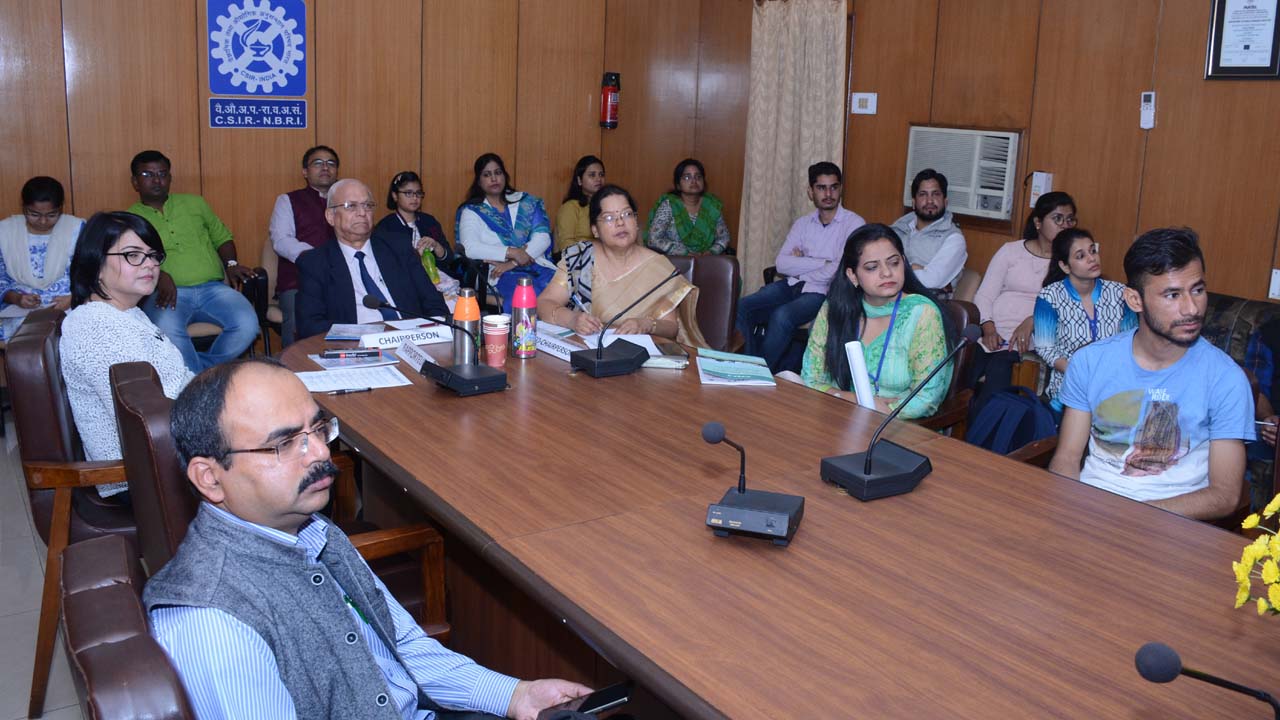
Besides, outstanding key note presentations by Prof. L.Q. Ma and Prof. Om P. Dhankher, the ‘Biomonitoring and Bioremediation’ session was covered by various presentations covering biomonitoring of water, air, global warming and soil contamination indicators and biomarkers. Presentations also included grasses as biomonitoring agents for global warming and their remediation through carbon sequestration. Some presentations dealt with hair as biomarker of vehicular heavy metal pollution. It also included various presentations dealing with bioremediation techniques to reduce the contamination from air, water and soil especially metal/metalloid through intervention of plants, fungus and nanotechnology. The role of plants like algae, lichen, fern, microflora, macroflora etc., was also emphasized by several speakers for biomontoring. Some of the presentations highlighted the role of nutrient like Se and microbes to reduce As contamination of food crop. Presentation also highlighted development of low grain arsenic rice variety for arsenic contaminated regions, such as West Bengal and others.
The session on the ‘Plant Responses to Environmental Pollution’, included the plant response to various stresses such as UV-B, ozone, heavy metal and metalloid, nanoparticles, salinity, benzyl butyl phthalate etc. The responses also showed pollutant toxicity amelioration by various abiotic components such as silicon, selenium, nitric oxide, -amunobutyric acid (GABA), salicylic acid, thiourea, ethylene di urea (EDU) and biotic components such as algae, bacterial consortia and mycorrhizal fungi at morphological, physiological and molecular level of various non crop and crop plants. Presentation topic included important air pollutants vis-à-vis plants water relations as also the drought responses in crop plants.
Besides, a key note presentation on water conservation models, session on ‘Contemporary Environmental Issues’ covered a lot of relevant presentations such as, bioporspection of endemic plants, system biology approaches in medicinal plants, legal aspects of air pollution, ionization radiation and human health, organic forming etc.
There was an enthusiastic participation of young researchers in presenting their research findings through the posters. The posters were evaluated by a committee comprising reputed scientists. Fourteen posters were awarded prizes for new concept and scientific content.
The Valedictory session was organized after the scientific sessions on the afternoon of 30th Nov, 2018 which was chaired by Prof. S.K. Barik, President ISEB & Director CSIR-NBRI, wherein, some distinguished delegates from different countries expressed their views about the outcome of the Conference. At the end of this session, Conference recommendations were presented and inputs taken from delegates.
